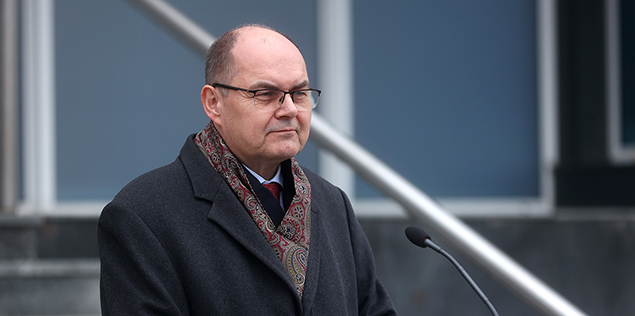On November 22nd, 1991, the Chairman of the Presidency of the Republic of Bosnia and Hercegovina, Alija Izetbegovic met with German Chancellor Helmut Kohl to discuss a peaceful future for an independent Bosnia-Herzegovina as part of the European family. To me, at the time a young member of German Federal Parliament dedicated to the European peace project, this visit gave hope that former Yugoslav Republics will peacefully transition to independent states. As we know, this and all the other international initiatives failed until four war-torn years later, on November 21, 1995, the Dayton Peace Treaty for Bosnia-Herzegovina was agreed. It stopped the bloodshed, the rapes, the expulsions, and crimes against humanity which had culminated in a Genocide.
International intervention was the only way to end the war. Those who survived the war remember well.
Apart from ending violence, the Dayton Treaty was also designed to form a basis for peaceful coexistence and eventually a flourishing state. The beginnings were promising. However, after nearly thirty years, disillusionment has set in. Doubts exist, whether the many opportunities provided by the international community and especially the European Union will be seized and when.
Dayton is the source of Bosnia-Herzegovina’s constitution, including its shortcomings. Therefore, it is often subject to criticism. I agree it is not perfect. But acknowledging that, we must not forget: By signing the General Framework Agreement for Peace in Bosnia and Herzegovina at the peace conference in Paris the parties agreed to be bound by it, including by the Constitution of Bosnia and Herzegovina, which is an integral part of the peace deal.
This does not mean it cannot be changed. As a matter of fact, the Dayton Agreement prescribes that the responsibility to correct, adjust and amend belongs to the elected representatives of all people and citizens in the BiH Parliamentary Assembly. So far, we have not seen them overcome the discriminatory shortfalls of the Dayton Constitution. Neither the High Representative nor the Peace Implementation Council nor the European Union nor Courts can substitute for the sufficient political will among local actors. Serbs, Bosniaks, Croats and Others have their rights not only as part of their ethnic groups, but as individual citizens, too.
Dayton’s conclusion out of the disaster of the early 1990s is: Bosnia and Herzegovina is a state and not a sum of entities. Neither the F BiH nor the Republika Srpska will therefore be members of the European Union but only the state of Bosnia and Herzegovina.
Bosnia and Herzegovina as defined in Dayton follows the concept of a multi-ethnic state. National Identity mattered to the people back in Yugoslav times and it does now, as every new election shows us. But this, of course, cannot justify discrimination in any form.
I suggest inclusion of a “Europe-clause” as an amendment to the Constitution of BiH, which is supported by all citizens. The admittedly complex state structure was designed to include a control mechanism that would ensure that the three constituent peoples and the Others would not feel ignored. In striving to uphold this principle, people originating from minorities such as the Roma and Jews do not have all political rights protected. The same applies to those who identify simply as citizens of Bosnia and Herzegovina without feeling allegiance to any of the constituent peoples. Unfortunately, on too many occasions political actors have exploited the Dayton checks and balances as instruments of obstruction and blockade.
The European Court of Human Rights in Strasbourg has found discrimination in several rulings such as the Sejdic/Finci and Zornic cases. All forms of discrimination must be removed from the constitutional framework.
There is no doubt that these decisions must be implemented in Bosnia and Herzegovina, and this is long overdue. This is why people ask me why the High Representative does not intervene with executive powers and simply alter the state constitution. The answer is: Amending the constitution itself is, for a good reason, not among my responsibilities, I am just the Guardian of its implementation. Only delegates in the Parliament can amend the Constitution or decide about a new one. Therefore, I invite the politicians in charge to start an initiative together to get these decisions implemented. This may include structures of integrative checks and balances for all.
Until we have another basis for this state, I advise not to discredit Dayton, but to improve it. Consultation and involvement of the society in this effort is key. Because the people know very well what is best and possible for the future of their country.
As in all democracies, such a process will require dialogue, a genuine commitment to find solutions, the willingness to compromise for the common good and also hard work.
With that in mind, Dayton can be the starting point for a prosperous Bosnia-Herzegovina in a united Europe.














